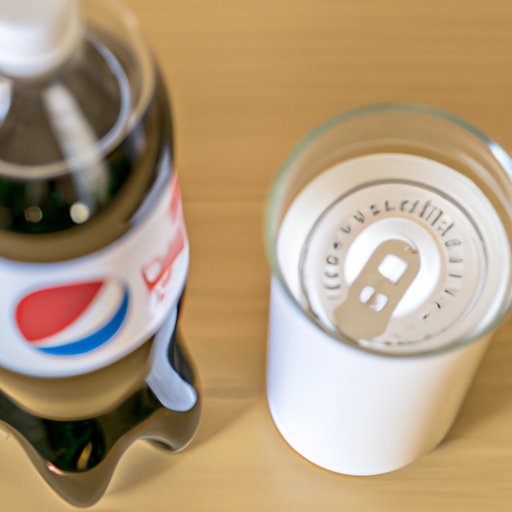Introduction
Diet soda is a type of soft drink that contains artificial sweeteners instead of sugar. It’s often seen as a healthier alternative to regular soda because of its lower calorie count. But is diet soda really healthy? In this article, we’ll explore the pros and cons of drinking diet soda, looking at both the potential health benefits and the risks associated with it.

Examining the Pros and Cons of Diet Soda
Switching from regular soda to diet soda can have some health benefits. But there are also some potential risks associated with drinking diet soda. Let’s take a closer look at each one.
Health Benefits of Switching to Diet Soda
The most obvious benefit of drinking diet soda is that it’s lower in calories than regular soda. This means that if you’re trying to watch your weight, it can be a helpful tool in reducing your overall calorie intake. Additionally, it’s free of added sugars, which can help reduce your risk of developing diabetes, heart disease, and other chronic conditions.
Risks Associated with Drinking Diet Soda
Although diet soda may seem like a healthier alternative to regular soda, there are still some risks associated with it. One study found that people who drank more than two cans of diet soda per day were more likely to develop metabolic syndrome—a condition characterized by high blood pressure, obesity, and other factors that can increase the risk of heart disease and stroke.
Exploring Potential Health Benefits of Switching to Diet Soda
Let’s take a closer look at some of the potential health benefits of switching to diet soda.
Impact on Blood Sugar Levels
One possible benefit of drinking diet soda is that it can help keep your blood sugar levels stable. Since diet soda doesn’t contain any added sugars, it won’t cause your blood sugar levels to spike, which can be beneficial for people with diabetes or pre-diabetes.
Reduced Risk of Tooth Decay
Another potential benefit of drinking diet soda is that it can help reduce the risk of tooth decay. Regular soda contains sugar, which can feed bacteria in your mouth, leading to tooth decay. Diet soda, on the other hand, is sugar-free, so it won’t contribute to tooth decay.

Investigating the Risks of Drinking Diet Soda
While there are some potential health benefits of drinking diet soda, there are also some risks associated with it. Let’s take a closer look.
Link to Metabolic Syndrome
As mentioned earlier, one study found that people who drank more than two cans of diet soda per day were more likely to develop metabolic syndrome. While the exact cause is unclear, it’s possible that the artificial sweeteners used in diet soda could be contributing to the development of this condition.
Possible Link to Certain Cancers
Some studies have suggested a link between drinking diet soda and certain types of cancer, such as kidney and bladder cancer. However, the evidence is not conclusive, and more research is needed to determine whether there is a direct link between diet soda and cancer.

The Impact of Diet Soda on Weight Loss
Many people turn to diet soda as a way to help them lose weight. But does it actually work? Let’s take a closer look.
Short-term vs. Long-term Effects
In the short term, drinking diet soda can be an effective way to reduce your calorie intake, which can lead to weight loss. However, in the long term, it may not be as effective. Studies have found that people who drink diet soda are more likely to gain weight over time than those who don’t drink it.
Does Diet Soda Help or Hinder Weight Loss?
Overall, it seems that diet soda may not be the best choice for weight loss. While it can help you reduce your calorie intake in the short term, it may not be as effective in the long term. Additionally, some studies have found that drinking diet soda can actually make you crave sugary foods, which could lead to weight gain.
Is Diet Soda Bad for Your Health?
So, is diet soda bad for your health? The answer isn’t clear-cut. There are both potential benefits and risks associated with drinking it. Ultimately, it’s up to you to decide whether or not it’s worth the potential risks.
Evidence for and against
On one hand, there is evidence to suggest that diet soda can be beneficial for people with diabetes or pre-diabetes, as it can help keep blood sugar levels stable. On the other hand, there is also evidence to suggest that it can increase the risk of metabolic syndrome and certain cancers. So, it’s important to weigh the evidence for and against before making a decision.
What do Experts Say?
Most experts agree that diet soda should not be consumed in large quantities. They recommend limiting your consumption to no more than two cans per day. Additionally, they suggest avoiding artificial sweeteners, as they may be linked to certain health risks.
Uncovering the Potential Dangers of Diet Soda
Finally, let’s look at some of the potential dangers of drinking diet soda.
Artificial Sweeteners
One of the main components of diet soda is artificial sweeteners, which have been linked to various health risks. Some of these include an increased risk of weight gain, headaches, and digestive issues. Additionally, some studies have suggested that artificial sweeteners may be linked to an increased risk of certain cancers.
Caffeine Content
Diet soda typically contains caffeine, which can have negative health effects when consumed in large quantities. Caffeine can cause insomnia, anxiety, and other symptoms, so it’s important to limit your consumption.
Conclusion
In conclusion, diet soda can be a useful tool for reducing your calorie intake and keeping your blood sugar levels stable. However, there are also some potential risks associated with drinking it, such as an increased risk of metabolic syndrome and certain cancers. Additionally, it contains artificial sweeteners and caffeine, which can have negative health effects. Ultimately, it’s up to you to decide whether or not diet soda is worth the potential risks.
(Note: Is this article not meeting your expectations? Do you have knowledge or insights to share? Unlock new opportunities and expand your reach by joining our authors team. Click Registration to join us and share your expertise with our readers.)
